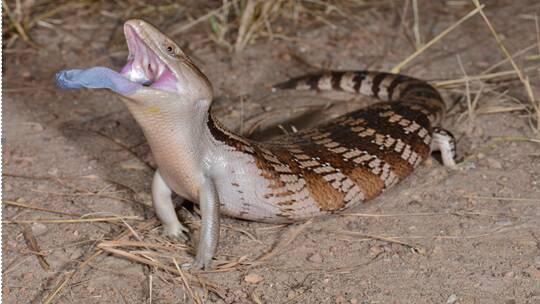IT MIGHT sound like the start of a joke to ask why blue-tongue lizards have a blue tongue. But it is a question asked – and answered – by Macquarie University scientists who wanted to know why blue-tongue lizards had a tongue unlike the pink one of most other lizards.
Subscribe now for unlimited access.
$0/
(min cost $0)
or signup to continue reading
The Lizard Lab research, published in the journal Behavioral Ecology and Sociobiology, found the blueys used their tongues as a last-ditch effort to avoid being eaten.
The research team led by Associate Professor Martin Whiting found the tongues had an ultra-violent component which was most obvious at the tongue’s rear.
“The lizard relies on camouflage to avoid hawks and other predators,” Associate Professor Whiting said.
“When that fails, the lizards poke out their tongues as far as possible distracting the birds with a flash of bright blue and ultra-violet tongues.”
He said the bright tongue would be visible under disco lights.
Associate Professor Whiting said the lizard’s tongues had a large surface area and were highly conspicuous, unlike other kinds of lizards.

“When blue-tongues do a ‘full tongue’ display, the mouth is opened widely, and the tongue is flattened and expanded.
“At the same time, they may hiss and puff-up their body for maximum effect. This behaviour, in combination with a highly conspicuous tongue, can be quite intimidating for anyone that has got too close to a wild bluey.”
Associate Professor Whiting, together with researchers Pau Carazo, Sam Price-Rees and Arnaud Badiane, placed blue-tongues in a large-outdoor enclosure and held them briefly to test their behavioural responses to fake predators.
The lizards were presented with a model snake, bird, fox, goanna and a piece of wood.
“Blueys did not respond much to the piece of wood while they showed a strong response to the model predators that would normally represent the greatest threat,” Mr Badiane said.
“By delaying their display until the predator was very close, and exposing the rear of the tongue, which has the most UV and is the brightest, blueys maximise their chance of intimidating a predator and surviving another day.”

